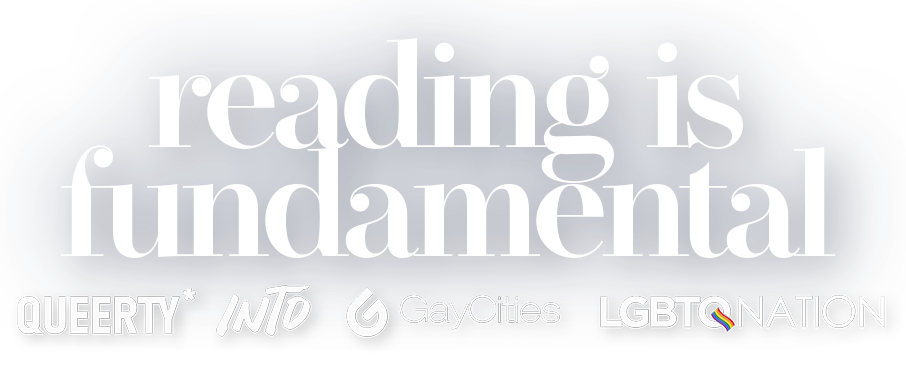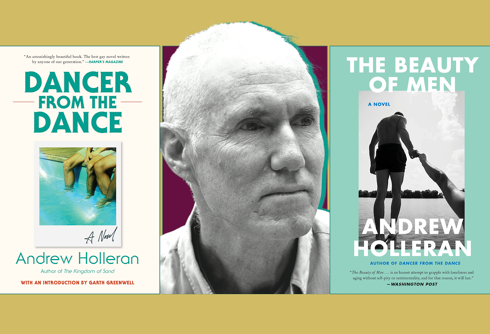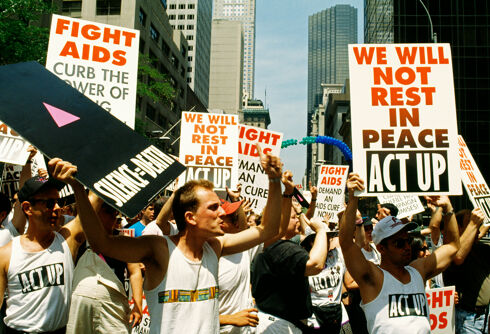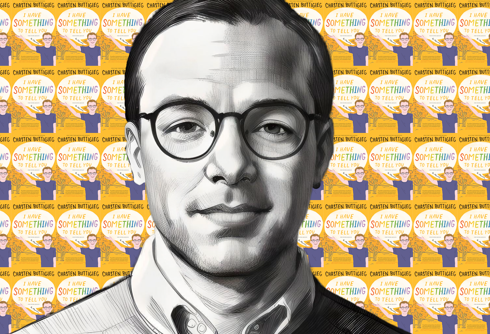The one real estate requirement for Giovanni’s Room was “a place with a big front window,” says co-founder Tom Wilson Weinberg. The vision — an LGBTQ+ bookstore — set a plan in motion that would change queer visibility in Philadelphia and open the door for access to diverse stories worldwide.
Weinberg and friends Dan Sherbo and Bern Boyle had begun engaging in LGBTQ+ activism and saw an unfulfilled niche for community engagement. It was 1973, and gentleman’s clubs, bars, and adult book shops — often hidden behind unmarked doors — dotted the city, but despite the Stonewall Riots just a few years before, queer life across the U.S. wasn’t all rainbows. (Gilbert Baker’s Pride flag didn’t even appear until 1978.)
At the time the trio conceived the idea, the American Psychiatric Association considered homosexuality a mental disorder. Pennsylvania still has yet to officially pass the Fairness Act, which includes protections against discrimination based on sex, sexual orientation, gender identity, or expression.
“It was hard to find a location,” Weinberg, now 78, told LGBTQ Nation. “Realtors didn’t have to give a reason; they’d just say no, though we insisted on saying it’d be a gay and feminist bookstore.” The twenty-somethings finally found a location on South Street — the first floor of a three-flat building with the requisite window, a physical manifestation of the visibility they hoped to achieve. And for a rent of $85 per month, Giovanni’s Room was in business. Over the decades, the storefront (named after James Baldwin’s novel) has changed owners and locations, proving a stalwart survivor of evolving economic and cultural times.
Never Miss a Beat
Subscribe to our newsletter to stay ahead of the latest LGBTQ+ political news and insights.

Fifty years later, the skyrocketing impact of online retailers and social media consumption makes every purchase — from Lex Croucher’s New York Times best-selling YA novel Gwen and Art Are Not in Love to the reissue of Andrew Holleran’s Dancer from the Dance — a win for local, queer-owned small businesses. Still, the forecast remains precarious. Despite a slow and steady increase over the past decade, with nearly 2,600 independent bookstore locations reported in 2023, LGBTQ+ entrepreneurs face a Medusa-like backlash. Conservatives toe the line with a record number of book ban attempts against LGBTQ+ titles. Meanwhile, decreased print book sales continue despite a handful of industry insiders advocating for queer authors.
Related:
Book banners came for this Colorado town. They didn’t anticipate resistance.
LGBTQ+ titles topped the number of book bans in the past year, but a growing number of grassroots organizations are rewriting the story.
One page at a time
“In early 1973, to open a [LGBTQ+] bookstore was a utopian vision,” says Weinberg. “We didn’t think we needed an insurance policy, but we did insure the front glass window; nobody ever threw anything.”
Ninety miles north in New York City, Craig Rodwell had opened Oscar Wilde Bookshop and would prove a valuable ally once Giovanni’s Room was up and running. Weinberg says Rodwell, a member of the Mattachine Society, a pre-Stonewall activism organization, was instrumental in suggesting what might sell. Together, they visited a wholesale bookseller in Brooklyn and “bought anything we considered queer-worthy” — cash only. To balance Rodwell’s populist side, friend, activist, and author Barbara Gittings suggested other titles from the queer canon.
Hobbled together from used furniture and makeshift shelves, the store included a modest collection — Oscar Wilde, Gore Vidal, Radclyffe Hall, and, of course, James Baldwin — along with local papers and pamphlets like Boston’s Gay Community News and their own newsletter, the Philadelphia Weekly Gayzette. The founders each volunteered twice weekly, though they often spent days off at the store.
After 18 months, plenty of good times, and little profit, the men stepped aside, selling Giovanni’s Room to good friend Pat Hill, who gave up a job at the Department of Recreation to keep the store alive.
“It was not a viable business. It was a wonderful idea,” Hill said at a 50th anniversary founder’s event held in August 2023 at Philadelphia’s William Way LGBT Community Center. “It was a very courageous thing to get going but hard to keep going because things hadn’t been written yet,” referencing the limited number of published queer titles.
The bookstore’s next chapter began in 1979 with the arrival of Ed Hermance and Arleen Olshan, who bought the store and its meager stock for $500 and moved its location to 12th and Spruce Street. Shortly after, the building was sold, and the new landlords were none too happy with queer tenants. Another move was imminent.
Hermance’s eclectic life had led him from a “hippie commune” in Colorado to a teaching gig in Germany, a food co-op, and finally to being a clerk at the University of Pennsylvania’s main library. Olshan was an artist and leatherworker from a working-class family. They were not typical business owners. But Giovanni’s Room was not your typical bookstore.
From the onset, Giovanni’s Room had been fueled by volunteers and a steady stream of customers, many of whom would circle the block before summoning the courage to enter. They would prove instrumental in the bookstore’s legacy.
“Giovanni’s Room was a gift from the community to itself. People wanted it. They were willing to contribute to it, volunteer, and support it.”
Ed Hermance
“Time was running out, and we’re gonna have to do something,” recalled Hermance, 83, at the founder’s event. “I had seen a property on 12th and Pine Street, but we never thought about buying because we didn’t have any money. But the deadline was coming. So we borrowed the down payment from our customers. Giovanni’s Room was a gift from the community to itself. People wanted it. They were willing to contribute to it, volunteer, and support it.”
In addition to being literary-minded, Hermance also proved to be entrepreneurial. Driving to New York City to load up a trunk full of books whenever they needed inventory wasn’t sustainable. Bob Koen, an old friend from Hermance’s food co-op gig, had launched a book wholesaler business across the Delaware River in New Jersey and was the first person to give Giovanni’s Room credit. And by the late ‘70s, a wave of queer authors and publishers had emerged.
Holleran’s Dancer from the Dance (1978), called “a meditation on ecstasy” by the New York Times, portrayed New York City gay life through a brutal kaleidoscopic lens and became an instant queer classic. Rita Mae Brown’s Ruby Fruit Jungle, published by the lesbian-owned independent press Daughters, Inc., paved the way for today’s sapphic coming-of-age novels.
The impact of Giovanni’s Room extended far beyond Philadelphia’s local LGBTQ+ community. By the early ‘90s, Hermance and Olshan had leveraged their relationships with publishers and started a wholesale business of their own, distributing queer titles worldwide. With a master’s degree in comparative literature and work experience overseas, Hermance was a natural. “During our biggest wholesale year, we sold to more than 80 bookstores in 17 countries,” Hermance tells LGBTQ Nation.
From books to activism
Giovanni’s Room was more than a bookstore. It became a haven during the height of the AIDS crisis at a time when mainstream America was burying the news, as well as thousands of gay men. In a 1982 press briefing, journalist Lester Kinsolving asked President Reagan’s press secretary Larry Speakes about the “gay plague” as the press pool laughed. After some banter, Speakes said, “I don’t know anything about it.”
“The store carried every fragment of information we could about this plague,” says Hermance, including safer-sex cartoon booklets — discreet accordion-style pages that could easily slip into one’s pocket. Employees from a nearby city health clinic known for STI testing would come by, stock up, and surreptitiously distribute the materials to patients.
Hermance says newly diagnosed people would come to the store to gather their thoughts about the harrowing reality of what was to come. “In those days, you’d be dead in six months. There was no question about it,” he says. “The store was a [place] to get your thoughts together: ‘How am I gonna tell everybody I know, and what am I going to do about it?’”
AIDS also hit the Giovanni’s Room family.
Joseph Beam, editor of In the Life: A Black Gay Anthology (Alyson Press, 1986), worked as the store’s bookkeeper and left to travel and promote the book. After his return, Beam had hoped to get his old job back, but the position had been filled. A year later, Hermance reached out to reconnect and invite Beam to lunch, but the call was never returned. Beam, 33 and HIV-positive, had died in his apartment, discovered by friends on December 27, 1988.
“I had grown weary of reading literature by white Gay men,” Beam, who had interviewed luminaries like Audre Lorde and Samuel Delaney, once wrote, “More and more each day, as I looked around the well-stocked shelves of Giovanni’s Room… I wondered where was the work of Black Gay men.”
Beam said In the Life was for “the brothers whose silence has cost them their sanity” and “the “2,500 brothers who have died of AIDS.” To date, more than 700,000 people in the U.S. alone have died of HIV-related illnesses, including Giovanni’s Room co-founder Bern Boyle. LGBTQ+ bookstores remain valuable information hubs for HIV, MPOX, and other diseases disproportionally affecting the queer community.
A cliffhanger leads to the next chapter

Giovanni’s Room continued to prosper, but after a decade, Olshan was ready to move on. Hermance amicably bought out his partner and acquired the adjacent building to expand. As the bookstore’s popularity grew throughout the ‘90s, so did the canon of LGBTQ+ authors.
But the industry was quickly shifting. Borders and Barnes & Noble expanded their operations, opening sprawling bookstores in malls and standalone locations nationwide. And on July 5, 1994, Jeff Bezos founded Amazon from his Bellevue, Washington, garage. Over the past three decades, the company, now valued at over $460 billion, has dominated the market, selling upwards of 300 million print books per year.
Hermance persevered, convinced that a personal connection with customers, authors, and publishers could keep the store afloat. But by 2014, the pressure had become too great. Original co-founder Weinberg and others tried their best to secure a buyer to no avail — until a creative solution emerged.
Local nonprofit Philly AIDS Thrift, led by co-founder and manager Christina Kallas-Saritsoglou, signed a two-year agreement to become the store’s proprietor and, in 2018, purchased the business and the building. Now officially called Philly AIDS Thrift@Giovanni’s Room, the bookstore’s legacy continues, with its proceeds distributed to communities in need.
Book lovers gather

Locals and visitors think of Giovanni’s Room, an established anchor of Philadelphia’s Gayborhood, as that reliable friend who’s always around in times of need. But volunteer Danny Maloney understands firsthand the importance of preserving queer books and queer spaces for the next generation.
Maloney, 29, grew up in nearby Bucks County, where he attended Catholic school. He developed an affinity for old movies and “campy things,” and, in turn, sought out novels in a similar style. He volunteered at the local library, but it wasn’t until pursuing a double major in English and Education at Philadephia’s Lasalle University that Maloney discovered explicitly queer characters and authors.
“This is a benefit of physical bookstores and physical libraries, that you don’t necessarily need to be looking for things, but you can browse and find what you didn’t know you needed at the time,” Maloney tells LGBTQ Nation.
Maloney began his teaching career in Baltimore, then moved back to Philadelphia in June 2020. He had occasionally frequented the bookstore during college and made a conscious effort to engage more with the queer community upon his return. He began volunteering, but the bibliophile wanted more.
“I had been volunteering at the store for over a year. I was finding it really fulfilling, but I wanted to meet more people and have certain types of conversations. Part of my mind gets animated and invigorated talking about texts,” says Maloney. “I approached one of the managers at the time, asking if there had ever been a [book club]. And in a classic instance, the following week, she was like, “Well, if you want to do this, it can happen.”

In August 2022, The Philly Queer Book Club was born. Maloney’s educational background came in handy for setting a reading schedule and drafting discussion prompts. He reached out to “every queer person I knew” and set up an Instagram profile. That first meeting attracted 20 or so attendees, half of whom were Maloney’s friends, but the word caught on. By the time the group read the store’s namesake title by James Baldwin, the numbers were exponential. “People really showed up,” recalls Maloney. “It was actually kind of stunning.”
Throughout the book club’s evolution, Maloney has witnessed the excitement surrounding a range of subjects and authors, proving the value of diverse representation among LGBTQ+ narratives.
“A lot of the participants often very strongly identify with things that we are reading,” says Maloney, highlighting past picks that have included Alison Bechdel’s graphic memoir Fun Home and Sarah Thankam Mathews’ All This Could Be Different, which portrays a Southeast Asian immigrant experience through a queer lens.
Maloney takes participant polls to inform book selections but also draws from his professional expertise, saying, “I want to make sure that we are reading from different eras, genres, and experiences to allow people to see themselves in the text if that is what they’re searching for.”
The future of LGBTQ+ bookstores

The resilience of Giovanni’s Room tells only part of the story. Rodwell’s Oscar Wilde Bookshop lasted until 2009. A Different Light Bookstore, at its height with locations in Los Angeles, San Francisco, and New York City, shuddered its last outpost in 2011. Washington D.C.’s Lambda Rising and Atlanta’s Outwrite Bookstore & Coffeehouse also closed after decades-long runs. But a new crop of LGBTQ+ bookstores is emerging, sometimes where you’d least expect them.
Dr. Jamie Harker opened Violet Valley Bookstore in Water Valley, Mississippi, in December 2017. An English professor at the nearby University of Mississippi, Walker has lived in the state for 20 years. She spent seven of them writing The Lesbian South, which uncovers the legacies of Southern feminists and the Women in Print movement, which built a network of women authors, publishers, and bookstores.
Harker’s research inspired deeper contemplation about continuing the legacy of the women who came before her. The former railroad town had proven hospitable over the years, drawing residents who worked at the university 18 miles to the north. Located on Main Street, the long, narrow shop dates back to the late 19th century. A cigar shop, barbershop, and art gallery have occupied the space, but Walker saw the potential for something different.
Much like Giovanni’s Room, Harker, 55, and her wife, with the help of a former student, sought their community’s support. A crowdfunding campaign raised more than $8,000, affording them the ability to stock shelves and jumpstart the opening.
Harker acknowledges that Water Valley, population 3,301, may not have the same kind of resources as a big city, but LGBTQ+ visibility still exists. “It’s easy to think there’s no queer culture here,” she says, “but there is. You just have to find different entry points.”
“People are looking for places to build physical community.”
Philly Queer Book Club founder Danny Maloney
Violet Valley Bookstore and dozens of other LGBTQ+-owned shops, like Under the Umbrella in Salt Lake City, Utah, and Montana Book Co. on Last Chance Gulch in Helena, Montana, prove that queer business owners, authors, and readers have a place amid 21st-century capitalism.
Giovanni’s Room co-founder Weinberg says, “We’ve needed and wanted books, movies, and TV shows that reflect our world. Coming out of the ‘60s and ‘70s, they were — for many of us — tragic.” But the stories evolved, as has the face of the LGBTQ+ community. No longer seen as a monolith, more queer voices — trans, gender expansive, and nonbinary — continue to emerge.
Book club leader Maloney recognizes the value in not only telling such stories but also sharing them. “There’s a unique alchemy of the room, where everyone is there and able to meet and see each other,” he says. “There’s a real need and hunger for that — people are looking for places to build physical community. An actual meeting place like Giovanni’s Room is irreplaceable.”
Featured image: (from left) Pat Hill, Tom Wilson Weinberg, Ed Hermance, and Arleen Olshan — part of the legacy of Giovanni’s Room. Photos courtesy of Philly AIDS Thrift @ Giovanni’s Room and the William Way LGBT Center. Photo illustration by Matthew Wexler.












